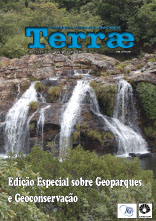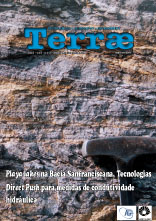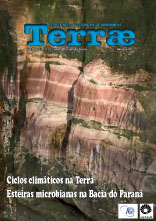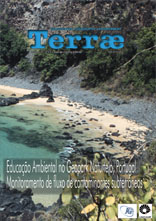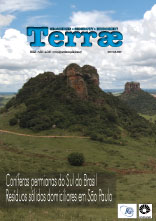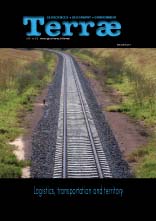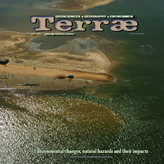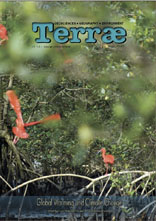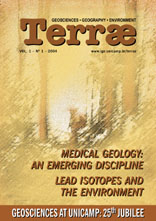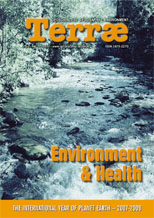Save the date / Call for papers
A revista Terræ publica simultaneamente as edições online de 2016 e 2017. As edições impressas acham-se temporariamente suspensas, pois os editores reconhecem que a internet oferece formas mais eficazes para disseminar rapidamente os resultados das pesquisas. As reformulações do periódico objetivam ampliar a abrangência, combinando redução de custos com rapidez de publicação. Cada vez mais a revista consolida a tendência de cobrir temas multidisciplinares que revelem formas de interação das Geociências com as diferentes áreas do conhecimento humano. A edição de Terræ 2017 é inteiramente dedicada ao tema GEOPARQUES.
A revista aceita trabalhos e comunicações em Português, Inglês e Espanhol.
Chamada de trabalhos / CALL FOR PAPERS
Uma vez recuperado o tempo de ausência na web, a edição de Terræ 2018 tornar-se-á uma boa opção para publicação de artigos científicos. O volume deverá reunir contribuições referentes a GEOÉTICA, tema que permite acomodar abordagens diferenciadas que revelem as inter-relações entre a sociedade e os ecossistemas terrestres.
O sistema de submissão e avaliação de artigos científicos está em pleno funcionamento, sendo feito exclusivamente pelo E-mail: terrae@ige.unicamp.br. Nosso sítio web está à sua disposição.
Esperamos sua visita e participação!
Os editores.
10/01/2018- 16:31 pm
Chamada de trabalhos/ Call for papers para o Volume 15, 2018
Novas contribuições são aceitas para o volume 2018 de Terræ.
Data limite 30.abril.2018
10/01/2018- 16:31 pm
Chamada de trabalhos/ Call for papers para os eventos:
VIII GeoSciEd 2018 – the 8th Quadrennial Conference of the
International Geoscience Education Organisation (IGEO)
– Geosciences for Everyone –
VIII Simpósio Nacional de Ensino e História de
Ciências da Terra / EnsinoGEO-2018
– Geociências para Todos –
Campinas – Sao Paulo – Brazil, July 2018
Acesse o site: http://www.ige.unicamp.br/geoscied2018/en/.
Data limite 11.fevereiro.2018
11/01/2018- 13:40 pm
Livro "Geologia do Brasil”, 2012: Reserve já seu exemplar, sem despesas de remessa.
Visite o endereço eletrônico: www.editorabeca.com.br
Os editores
Campinas, janeiro de 2018.
Editorial
Terrae is pleased to present this issue, which focuses on Energy and Petroleum. Oil and gas will continue to play an important role in supplying energy for the world throughout the first half of this century. Undoubtedly, this is the consensus view held by numerous studies on prospective energy markets, whose predictions assume that the oil and gas industry will have the ability to deliver hydrocarbons in the quantities required by consumers. Sustaining such production trends for the future, however, depends on several key factors, such as: skilled human resources, sufficient capital investment, continuing technological progress, and available technologies to minimize the environmental impacts of oil and gas operations.
Today, Brazil’s energy profile is that of a rapidly growing country in the midst of economic development with a reasonable supply of indigenous resources. Brazil’s current situation reflects its attempts to satisfy and accommodate competing needs and challenging sustainable development goals. It is a special case that combines renewable and non-renewable energy resources. The country has a relatively ‘clean’ energy system, relying significantly on renewable energy sources such as biomass, hydropower and nuclear power. Hydrocarbon resources also make up an important share of Brazil’s energy supply, and that poses significant challenges and responsibilities for anyone who is a stakeholder.
A new petroleum regulatory framework was created by Petroleum Law 9.478/97, which ended more than forty years of Petrobras’ monopoly on exploration and production activities. New rules were established, and sealed competitive bidding for acreage was controlled by a regulatory agency (ANP) based up on state coordination council (CNPE). Important indicators have been achieved since this new policy setting began in the late 90s, such as: Brazil achieved relative self-sufficiency in petroleum production in 2007, the share of petroleum activities in the economy accounted for approximately 9% of the GDP, and the government’s earning, resulting from royalties and special participation, reached more than US$ 9 billion in 2008.
The recent discoveries of giant pre-salt accumulations in Santos Basin as well as in other provinces gave significant competitive advantage to the country as an important player in the present scenario of higher volatility in oil prices. These discoveries also represent an important achievement by the Petroleum Law for exploration and production of hydrocarbon resources. Other aspects of these discoveries are the interdependences on technological innovations that combines high risk and high reward premiums for exploration and production in new challenging environments with salt layers over 2000 m, heterogeneous layered carbonates reservoirs, water depth over 2200 m, and special logistics to bring the associated gas volumes to long-distance consumers markets.
Important characteristics of pre-salt discoveries, as well as the actual profile of producing fields in Brazil, are technological capability in deep waters and logistics required to transform resources into reserves. What is badly needed, however, is capital investment in projects to unlock new hydrocarbon resources in Brazil, be they the new paradigm of Santos Basin pre-salt resource development or the explotation of heavy oil reserves in deep water.
Technological progress has always been the key factor in Brazil that made it possible to achieve important records in deep water horizons. However, it is important that the regulatory environment should be preserved, which will bring incentives to the investment climate and technological innovations that will enable these new resources to be developed in a cost-effective way and will accelerate implementation of new projects.
Let us now turn to the ways in which the contributors have addressed these matters and different perspectives on the theme Energy and Petroleum.
Osvair V. Trevisan, Fernando A. França, C.A Okabe and A.C.Lisboa survey a subject that is of tremendous importance in petroleum technology: the management of a heavy oil technology development program. Despite recent discoveries of light oil, Brazil presently possesses reserves of heavy oil that reach 7 billion barrels, representing more than 40 % of proven volumes. The authors pointed out that a program for technology development for heavy oil so comprehensive and complex involves a lot of planning, leading initiatives, efforts for plenty of communication between agents of diverse cultures and interests among academia, service companies and operators.
Considering that exploration and production of hydrocarbons is a risky venture, which encompasses different types of uncertainties, i.e., geological, financial, economic, fiscal and regulatory, in addition to political stability, Saul B. Suslick, Denis Schiozer and Monica Rodrigues review some important contributions and methods to help understand the impacts of new discoveries as well as for asset development and production. Despite the limitations of risk analysis methods, the authors show in the paper that risk analysis has several strengths and achievements in petroleum exploration and production. First, risk analysis provides a means of handling highly complex decisions characterized by multiple objectives and high degrees of uncertainty in diverse stages of petroleum upstream. Second, risk analysis provides an approach for dealing with complex value tradeoff and preferences of the stakeholders in the decision making process in oil exploration and production.
Third, risk analysis provides a systematic and comprehensive way for considering all relevant factors in the E&P decision making process.
Monica Rodriguez and Saul Suslick use historical data to show that Brazilian auctions are an important case in petroleum exploration for an efficient allocation mechanism and as resource rent taxation. The authors indicated that bids provide the government with several advantages, such as information about the value of geological tracts, considerable revenues from the payment of cash bonus, and domestic industrial development generated by the percentage of local content accepted by the firms in bids for exploration and production phases.
Andre Furtado presents a relevant discussion about the changes that have occurred in the Brazilian energy matrix since the first oil shock. The substitution of oil by other energy sources such as ethanol, but also the reduction of energy intensity of high oil product consumption, and primarily the improvement of domestic oil production were important changes pointed out by the author. According to the author, the country increased its dependence on natural gas and approximately 40 % of consumed natural gas was imported in 2006. This external dependence on Bolivia for gas supply presents some limitations and a diversified perspective created several obstacles for regional energy integration from both countries, mainly because the division of energy rent is not always convergent.
Alexandre Campane Vidal
Executive Committee
A PDF reader is required to view the article files. Make the download here: Adobe Acrobat or Foxi



